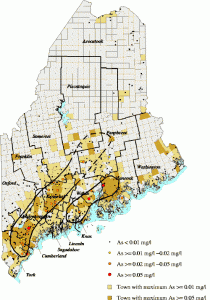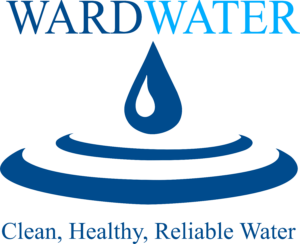Arsenic in Maine Water
 What is Arsenic ?
What is Arsenic ?
Arsenic is a tasteless and odorless carcinogen. It’s a naturally occurring element, which means it can be found organically in soil, plants, air and water.
In addition it can be found in many man-made applications including industrial and agricultural practices.
Is my Family at Risk?
Once Arsenic has entered ground water it can easily find its way into a home’s water
supply-the same water we use for drinking and cooking.

Long term exposure to Arsenic has been linked to cancer of the bladder, lungs, skin, kidneys, nasal passages, liver and prostate.
Health risks associated with Arsenic are directly related to factors such as:
- The concentration of Arsenic in your water
- The volume of Arsenic contaminated water a person consumes
- Length of time of exposure
- Age
- Your current health and certain predispositions to disease and illness.
- Lifestyle habits
If you have concerns for your family’s safety or to learn more about the health effects of Arsenic, we strongly recommend visiting the EPA’s Guide to Arsenic in Drinking Water.
 Is Arsenic Only in Maine?
Is Arsenic Only in Maine?
Arsenic can be found in high concentrations throughout the country including many parts of New England.
*In 2010 the U.S. Geological Survey released a landmark four year survey which detected and mapped more than 11,000 Maine private wells for Arsenic levels which exceed the Federal standard of 10 parts per billion (10 ug/L).
Of those towns that ranked highest, some of the most elevated concentrations were found in Southern Maine towns such as Gorham, which had more than 57% of its wells testing above the federal standard and Scarborough which tested at 48%.
In addition many Central Maine towns reported high concentrations including Manchester at 62%: and Readfield at 49%.
Should I Have my Water Tested?
If you have any question that your drinking water supply may have Arsenic we strongly recommend having your water tested.
Ward Water offers in home testing for the presence of Arsenic 3 and Arsenic 5. In addition we’re happy to advise you on the various State Certified Testing Laboratories available.
How do I get Rid of Arsenic?
With more than a decade of experience in Arsenic Removal, Ward Water is highly skilled in the installation of Arsenic mitigation systems. There are multiple treatment options for both whole-house and point of use Arsenic treatment.
Some of these systems include Absorptive Media Filtration, Reverse Osmosis and Ion Exchange removal.
The exact type of treatment method that will be best suited for your family will depend on many factors, such as:
- The quantity or concentration of Arsenic in your water
- Other minerals or contaminants that might be in your water
- Family lifestyle and individual preferences, including how much water your household uses
- Health factors including age, fitness level and predispositions to certain illnesses and diseases
What to do Next
Feel free to visit our Water Resource Blog, where you’ll find helpful articles about Arsenic and a range of other water related topics.
Or, if you’d like to speak with us directly with any questions you can contact our office via phone or email. We’ll be happy to offer advice on treatment & testing or set a time to meet at your home free of charge.
Arsenic in Maine Water
Arsenic is a tasteless and odorless carcinogen. It’s a naturally occurring element, which means it can be found organically in soil, plants, air and water.
In addition it can be found in many man-made applications including industrial and agricultural practices.
Is my Family at Risk?
Once Arsenic has entered ground water it can easily find its way into a home’s water
supply-the same water we use for drinking and cooking.

Long term exposure to Arsenic has been linked to cancer of the bladder, lungs, skin, kidneys, nasal passages, liver and prostate.
Health risks associated with Arsenic are directly related to factors such as:
- The concentration of Arsenic in your water
- The volume of Arsenic contaminated water a person consumes
- Length of time of exposure
- Age
- Your current health and certain predispositions to disease and illness.
- Lifestyle habits
If you have concerns for your family’s safety or to learn more about the health effects of Arsenic, we strongly recommend visiting the EPA’s Guide to Arsenic in Drinking Water.
Arsenic can be found in high concentrations throughout the country including many parts of New England.
*In 2010 the U.S. Geological Survey released a landmark four year survey which detected and mapped more than 11,000 Maine private wells for Arsenic levels which exceed the Federal standard of 10 parts per billion (10 ug/L).
Of those towns that ranked highest, some of the most elevated concentrations were found in Southern Maine towns such as Gorham, which had more than 57% of its wells testing above the federal standard and Scarborough which tested at 48%.
In addition many Central Maine towns reported high concentrations including Manchester at 62%: and Readfield at 49%.
Should I Have my Water Tested?
If you have any question that your drinking water supply may have Arsenic we strongly recommend having your water tested.
Ward Water offers in home testing for the presence of Arsenic 3 and Arsenic 5. In addition we’re happy to advise you on the various State Certified Testing Laboratories available.
How do I get Rid of Arsenic?
With more than a decade of experience in Arsenic Removal, Ward Water is highly skilled in the installation of Arsenic mitigation systems. There are multiple treatment options for both whole-house and point of use Arsenic treatment.
Some of these systems include Absorptive Media Filtration, Reverse Osmosis and Ion Exchange removal.
The exact type of treatment method that will be best suited for your family will depend on many factors, such as:
- The quantity or concentration of Arsenic in your water
- Other minerals or contaminants that might be in your water
- Family lifestyle and individual preferences, including how much water your household uses
- Health factors including age, fitness level and predispositions to certain illnesses and diseases
What to do Next
Feel free to visit our Water Resource Blog, where you’ll find helpful articles about Arsenic and a range of other water related topics.
Or, if you’d like to speak with us directly with any questions you can contact our office via phone or email. We’ll be happy to offer advice on treatment & testing or set a time to meet at your home free of charge.
RECENT BLOG POSTS
Arsenic and Children IQs | Concerns from Recent Maine Study
Arsenic and Children – Is your child’s IQ affected by [...]
Reverse Osmosis & Hard Water | What You Need to Know
Reverse Osmosis Systems are remarkable pieces of equipment. They do [...]
Bacteria in Your Drinking Water| How to Fix It
Requesting bacteria water testing, when buying or selling a home, [...]
Buying a Home? | 5 Signs the Water May Have Problems
Be your own DIY Water Detective! So, you just found [...]





